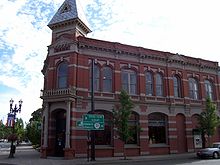| Revision as of 02:47, 27 October 2015 editValfontis (talk | contribs)Autopatrolled, Administrators80,824 edits →Projects on the National Register: space← Previous edit | Revision as of 02:54, 27 October 2015 edit undoValfontis (talk | contribs)Autopatrolled, Administrators80,824 edits full datesNext edit → | ||
| Line 1: | Line 1: | ||
| ] and grounds]] | ] and grounds]] | ||
| '''Walter D. Pugh''' ( |
'''Walter D. Pugh''' (April 4, 1863 – November 23, 1946)) was a prominent architect in ], ], ]. | ||
| The son of a carpenter, Pugh began designing buildings in Salem when there were only a few thousand residents, and in nearby ] when it had a little over a thousand residents.<ref>Foster, Janet W. ''The Queen Anne House: America's Victorian Vernacular''</ref> Pugh designed Salem's ] buildings being constructed in 1907-1908,<ref> Board of Trustees and Superintendent of the Institution for Feeble-Minded, page 11</ref> including an addition to the "J Building", which has since been demolished.{{Citation needed|date=April 2010}} | The son of a carpenter, Pugh began designing buildings in Salem when there were only a few thousand residents, and in nearby ] when it had a little over a thousand residents.<ref>Foster, Janet W. ''The Queen Anne House: America's Victorian Vernacular''</ref> Pugh designed Salem's ] buildings being constructed in 1907-1908,<ref> Board of Trustees and Superintendent of the Institution for Feeble-Minded, page 11</ref> including an addition to the "J Building", which has since been demolished.{{Citation needed|date=April 2010}} | ||
| Line 33: | Line 33: | ||
| | ALTERNATIVE NAMES = | | ALTERNATIVE NAMES = | ||
| | SHORT DESCRIPTION = American architect | | SHORT DESCRIPTION = American architect | ||
| | DATE OF BIRTH = |
| DATE OF BIRTH = 1863 | ||
| | PLACE OF BIRTH = | | PLACE OF BIRTH = | ||
| | DATE OF DEATH = |
| DATE OF DEATH = 1946 | ||
| | PLACE OF DEATH = | | PLACE OF DEATH = | ||
| }} | }} | ||
| {{DEFAULTSORT:Pugh, Walter D.}} | {{DEFAULTSORT:Pugh, Walter D.}} | ||
| ] | ] | ||
| ] | ] | ||
| ] | ] | ||
| ] | ] | ||
| ] | ] | ||
Revision as of 02:54, 27 October 2015

Walter D. Pugh (April 4, 1863 – November 23, 1946)) was a prominent architect in Salem, Oregon, United States.
The son of a carpenter, Pugh began designing buildings in Salem when there were only a few thousand residents, and in nearby Eugene when it had a little over a thousand residents. Pugh designed Salem's Oregon State Hospital buildings being constructed in 1907-1908, including an addition to the "J Building", which has since been demolished.
A number of his buildings are listed on the National Register of Historic Places (NRHP).
Projects on the National Register


- Independence National Bank (1891), 302 S Main St., Independence
- Bush and Brey Block and Annex, 179-197 Commercial St. NE, Salem, built for Asahel Bush II and Mortiz Brey, a cabinet maker
- Bush–Breyman Block (1889), 141-147 Commercial St. NE, Salem
- Shelton-McMurphey-Johnson House, 303 Willamette St., Eugene
- Buildings on the Oregon State Hospital campus
- Chemeketa Lodge No. 1 Odd Fellows Buildings (Grand Theater) (1900), 185-195 High St. NE, Salem, (1921 annex designed by Morris H. Whitehouse)
- United Presbyterian Church and Rectory (Whitespires) (1891), 510 SW 5th Ave., Albany, with H. C. Chamberlain
- Thomas Kay Woolen Mill, 260 12th St. SE, Salem
Other projects
- The former Salem City Hall (1893), demolished 1972 after a bond measure to preserve it failed, corner of High and Chemeketa streets
- The dome of the second Oregon State Capitol, which burned in 1935
- LeBreton Cottage (1908) at Fairview Training Center
References
- Foster, Janet W. The Queen Anne House: America's Victorian Vernacular
- Biennial report, Issue 1 Board of Trustees and Superintendent of the Institution for Feeble-Minded, page 11
- "National Register Information System". National Register of Historic Places. National Park Service. March 13, 2009.
- Bush & Brey Block & Annex 179-197 Commercial Street NE, Historic Places Salem Oregon
- Images of the Past (12/24/06) Statesman Journal
External links
- Images of works by Pugh from the University of Oregon digital archives